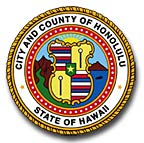Vote on transit tax
expected next week
The tax increase is estimated
to bring in $150 million a year
The City Council is expected to vote next week on whether Oahu residents should pay more in general excise taxes for mass transit.
 "This decision we're going to make on passing this excise tax ... is arguably the most significant decision that any Council will ever have made," Councilman Gary Okino said.
"This decision we're going to make on passing this excise tax ... is arguably the most significant decision that any Council will ever have made," Councilman Gary Okino said.
Yesterday, the proposed general excise tax surcharge cleared the final committee approvals, with the joint Transportation and Budget committees voting 5-2 to advance Bill 40 to the full Council next Wednesday. The council will discuss the bill at Kapolei Hale, an area where support for transit solutions appears high, Mayor Mufi Hannemann said.
In 1992, the City Council voted 5-4 to defeat a tax increase to finance a proposed rail project.
This time around, the bill would raise the excise tax on Oahu to 4.5 percent from the current 4 percent.
The tax would be levied beginning January 2007, according to the bill, and the 0.5 percentage point increase is estimated to bring in $150 million annually for the city's mass transit project that could be rail transit.
The state Legislature gave the city the new taxing authority earlier this year but mandated that the Council vote to enact the tax by the end of this year.
Not everyone is eager to see it get this far.
"Basically, what we have before us is a bludgeon from the Legislature," said Councilwoman Barbara Marshall, who voted against Bill 40. "We're sitting here preparing to levy a new ... excise tax on something. We don't even know what that is."
|
"Basically, what we have before us is a bludgeon from the Legislature. We're sitting here preparing to levy a new ... excise tax on something. We don't even know what that is."
Barbara Marshall City councilwoman who voted against Bill 40
|
Council Transportation Chairman Todd Apo said it would "be great if we could have the complete plan before us before passing this enabling legislation, but the fact is we're unable to do that. We need to act with the cards that we're dealt."
Cliff Slater of the group Honolulutraffic.com said that with no financial plan in place, the city could potentially be "headed down a fiscal black hole."
That includes, other opponents contend, the possibility that the city may not have enough funds to cover the full cost of the project.
"This tax increase will only be the first among many if rail is forced upon us," said Darci Evans of Charley's Taxi.
But city Transportation Services Director Ed Hirata said the study that will be conducted over the next 18 months will look at all the transit alternatives and their financial plans.
"We're not starting from scratch because we will be looking at all of the work that has been done and we will use to the degree that we can the information that was developed in the '92 plan," Hirata told the committee.
The 1992 vote meant that the city lost more than $600 million in federal funds.
U.S. Rep. Neil Abercrombie told the committees yesterday that he's not sure how much federal funding the city could get this time, but he cautioned against a repeat of history.
"If you don't pass it, then everything is, well, that's the end of it," he said.
Hannemann said he believes Council members who have voted in favor of Bill 40 are doing the right thing and he expects people in West Oahu will "come out in droves" to support the transit solution.
Hannemann also discounted critics who say he and other supporters are pushing rail as a transportation solution, reiterating his plans for a ferry, reversing the traffic flow by relocating jobs to Kapolei and synchronization of traffic signals.
"I don't believe we are railroading this at all," Hannemann said after the meeting.
www.co.honolulu.hi.us/council/index1.htm
E-mail to City Desk
[News] [Business] [Features] [Sports] [Editorial] [Do It Electric!]
[Classified Ads] [Search] [Subscribe] [Info] [Letter to Editor]
[Feedback]
